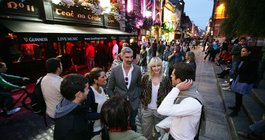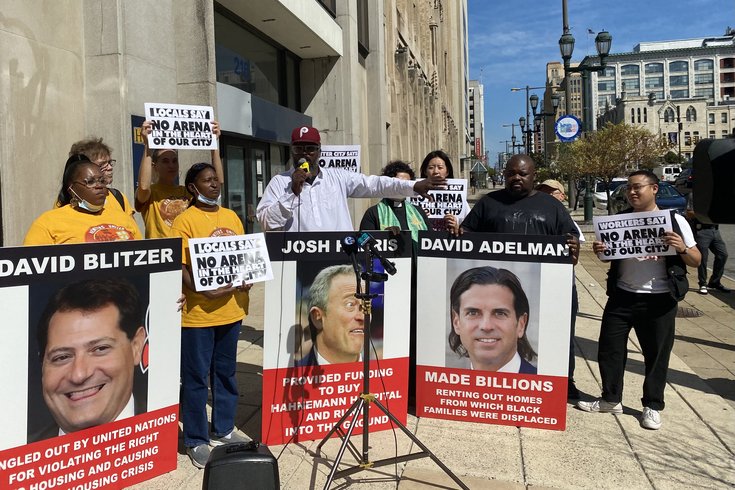
September 12, 2023
 Kristin Hunt/PhillyVoice
Kristin Hunt/PhillyVoice
Shawmar Pitts, co-director and policy coordinator of Philly Thrive, spoke at an anti-arena press conference outside Hahnemann Hospital on Tuesday.
Housing activists insisted Tuesday that opposition to the proposed 76ers arena was not about Chinatown — or at least, not just about Chinatown. It was about the UC Townhomes, Black Bottom and Hahnemann University Hospital, the shuttered building looming behind them during their fiery press conference.
"This arena is a prime example of the model of predatory development and displacement for profit," Shawmar Pitts, co-director and policy coordinator of Philly Thrive, said in a statement. "We know these developers aren't just preying on one neighborhood, they're coming for all of us."
Opposition to the 76 Place project has long been led by Chinatown activists, who argue residents and business owners will be priced out of the neighborhood because of the proximity of the arena, which is proposed to be between 10th and 11th streets, and Market and Cuthbert. On Tuesday, they were joined by members of housing rights organizations who say they've already lost homes to development, and see alarming similarities in the arena proposal.
One of them was Theresa Howell, an activist for Renters United. She recalled growing up in South Philly, where "everyone in my family owned their own homes." Grandmas on the block watched kids like her, who also ventured up to Chinatown to play with friends who had smuggled out treats from their families' restaurants. But her family was eventually displaced, she said, by "the same old development-for-profit model." Now, she rents an apartment from a landlord who does "paper mache" patches instead of repairs, she said.
Though her landlord is not David Adelman, Josh Harris nor David Blitzer, the developers behind 76 Place, she considers them one and the same.
"I've lived in these conditions for years because of landlords like these three," she said. "You think what's happening in Chinatown is different because it's a stadium, but it's not. It's the same corporate greed that's pushing people out of their neighborhoods and their lives. The same thing is happening in black and brown and low-income communities all across the city."
Another speaker, Mel Hairston, lived in the UC Townhomes, near 39th and Market streets in University City, for nearly 30 years until he received a letter from the property owner, IBID Associates, informing him that it was ending its affordable housing contract with the U.S. Department of Housing and Urban Development. He had one year to move out. A lengthy battle between the tenants, city and owner ensued, resulting in a settlement that allowed IBID Associates to demolish and sell most of the land, apart from a half-acre earmarked for new affordable housing.
"Hardworking citizens have done right by the rules, so to speak," he said after the conference. "A lot of my neighbors and residents of the townhomes, we're done with being cordial. We tried that approach. It got nothing."
Protestors also invoked Black Bottom, a West Philly neighborhood that was demolished to make way for development in University City, and Hahnemann University Hospital, the site of Tuesday's press conference. Before the Center City trauma center closed its doors in 2019, it historically catered to low-income patients. It closed one year after it was acquired by American Academic Health System, an affiliate of the California investment firm Paladin Healthcare.
76 Devcorp disputed the protestors' characterization of the project, pointing to new arena renderings released last month that include a residential tower with affordable housing. The group has also emphasized its $50 million community benefits agreement, which has not yet been defined, but could fund street cleaning, upgraded pedestrian lights and/or business loyalty programs to support small businesses.
"It's disappointing, but not surprising, that people who announced their opposition to 76 Place before they knew its details are increasingly relying on hyperbolic and false statements," the spokesperson said. "The facts are clear and undisputed: 76 Place will not displace a single resident or business, it will benefit communities of color through a legally-binding $50 million Community Benefits Agreement – largest in city history – the inclusion of mixed income residential housing, generation of $1 billion in new taxes for the city and School District, and serve as an anchor for the redevelopment of East Market Street all without a penny of city tax dollars. We look forward to continuing to educate the public about our project and making major announcements of support in the coming weeks."
The housing additions have not swayed opponents, who remain wary of the project. In August, they cited Blitzer's senior executive role at Blackstone, which the United Nations has accused of fueling a global housing crisis in 2019, and on Tuesday a large sign featuring the information and Blitzer's grinning face was on display.
Identical signs showed Blitzer's partners' faces, calling attention to Adelman's real estate holdings in University City and the role Harris's former private equity firm played in the sale of Hahnemann University Hospital, which precipitated its closure.
When the Rev. Hannah Capaldi, co-pastor of First Unitarian Universalist Church of Philadelphia, took the mic, she drew on the symbol for the former hospital behind her.
"Behind us stands the empty shell of Hahnemann Hospital," Capaldi said. "And out here on this sidewalk, I feel ghosts. The ghosts of those who died from substandard care, too-low staffing ratios, stressed nurses and doctors, forced to see too many patients a day chasing profits for private equity, insisting that they could squeeze evermore money out of health care. The ghosts of good union jobs, 800 at least, which evaporated when they closed this place down.
"And now it sits vacant, waiting to be used as a chess piece in the long game developers play with our lives, our neighborhoods, our city."
Follow Kristin & PhillyVoice on Twitter: @kristin_hunt
| @thePhillyVoice
Like us on Facebook: PhillyVoice
Have a news tip? Let us know.